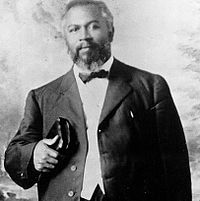
Back ويليام جاي سايمور Arabic William J. Seymour German William J. Seymour Spanish William J. Seymour Finnish William Joseph Seymour French William J. Seymour Hungarian ウィリアム・ジョセフ・シーモア Japanese 윌리엄 J. 시모어 Korean William Seymour Dutch William Joseph Seymour NB
William Joseph Seymour | |
|---|---|
 Leader of the Azusa Street Revival William J. Seymour | |
| Born | May 2, 1870 Centerville, Louisiana, United States |
| Died | September 28, 1922 (aged 52) Los Angeles, California, United States |
| Occupation | Evangelist |
| Spouse(s) | Jenny Evans Moore, 1906–1922, (his death) |
| Part of a series on |
| Pentecostalism |
|---|
 |
|
|
William Joseph Seymour (May 2, 1870 – September 28, 1922) was an African-American holiness preacher who initiated the Azusa Street Revival, an influential event in the rise of the Pentecostal and Charismatic movements. He was the second of eight children born to emancipated slaves and raised Catholic in extreme poverty in Louisiana.
Seymour was a student of the early Pentecostal minister Charles Parham, and he adopted Parham's belief that speaking in tongues was the sign of receiving the baptism in the Holy Spirit. In 1906, Seymour moved to Los Angeles, California, where he preached the Pentecostal message and sparked the Azusa Street Revival. The revival drew large crowds of believers as well as media coverage that focused on the controversial religious practices as well as the racially integrated worship services, which violated the racial norms of the time. Seymour's leadership of the revival and publication of The Apostolic Faith newspaper launched him into prominence within the young Pentecostal movement. Seymour broke with Parham in 1906 over theological differences as well as Parham's unhappiness with interracial revival meetings.
As the revival's influence extended beyond Los Angeles through evangelism and missionary work, Seymour was in the process of developing the revival into a larger organization called the Apostolic Faith Movement. This process was ultimately defeated by power struggles with other ministers, such as Florence Crawford and William Howard Durham, which ultimately damaged the unity of the early Pentecostal movement and led to a decrease in Seymour's influence. By 1914, the revival was past its peak, but Seymour continued to pastor the Apostolic Faith Mission he founded until his death. The revival acted as a catalyst for the spread of Pentecostal practices, such as speaking in tongues and integrated worship, throughout the world. It also played an important role in the history of most major Pentecostal denominations.
© MMXXIII Rich X Search. We shall prevail. All rights reserved. Rich X Search